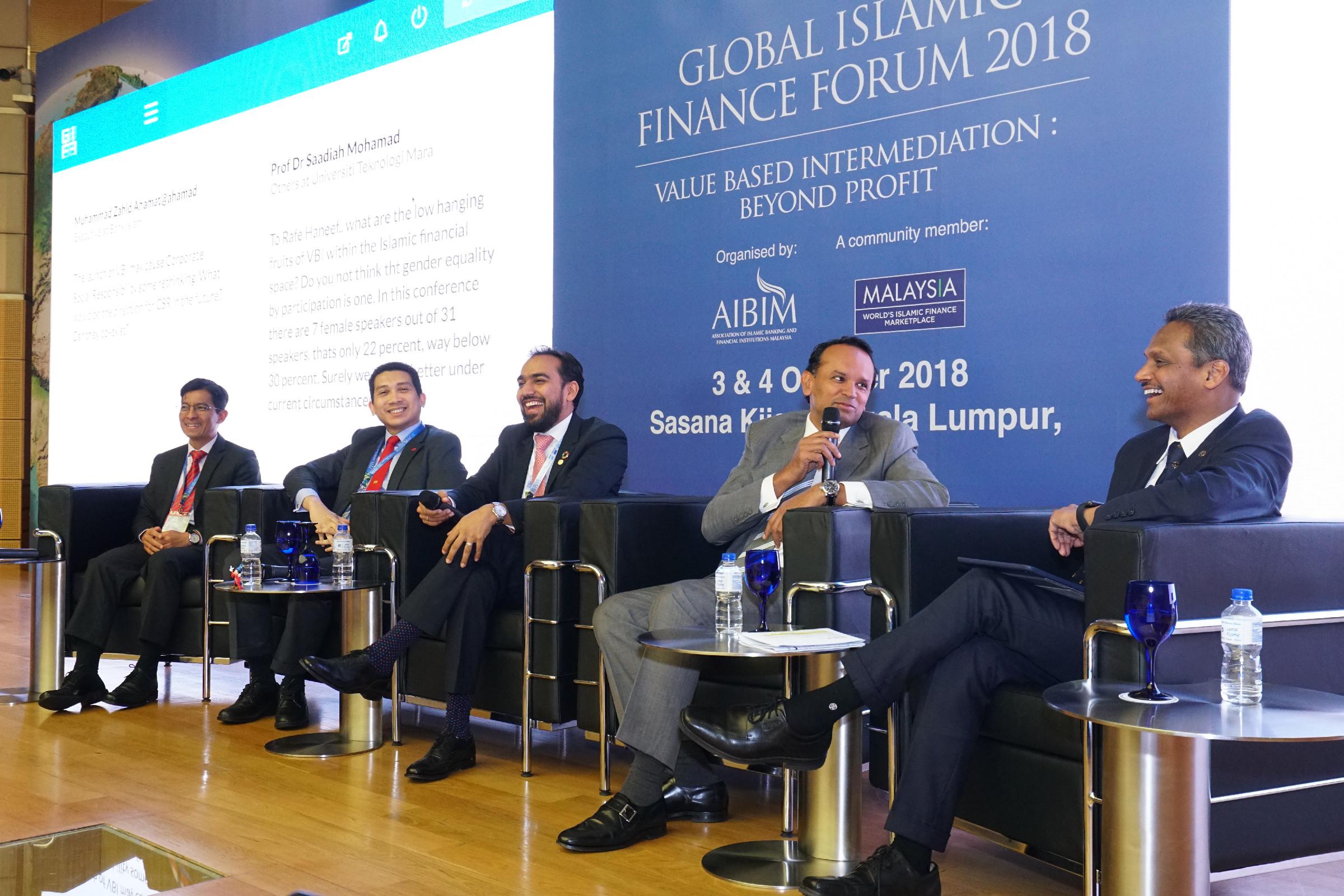Islamic bank CEO calls for Malaysian regulator to lower financing costs for VBI adopters
Photo: Bank Islam CEO Mohd Muazzam Mohamed, AmBank Islamic CEO Eqhwan Mokhzanee, HSBC Amanah CEO Arsalaan Ahmed, CIMB Islamic CEO Rafe Haneef, and Bank Negara Malaysia deputy governor Abdul Rasheed Ghaffour, on a panel at the Global Islamic Finance Forum (GIFF) on Oct 4, 2018 in Kuala Lumpur, Malaysia. Photo courtesy GIFF 2018
KUALA LUMPUR - Islamic banks adopting the Value-based Intermediation (VBI) guidelines released by Bank Negara Malaysia (BNM) should be given lower financing costs for being so-called “good citizen” banks that focus on the triple social, environmental, and financial bottom line, CIMB Islamic CEO Rafe Haneef told delegates at an industry conference in Kuala Lumpur on October 4.
“If a company is a good citizen in the community that is focusing on the triple bottom line, what will you do about the companies that only focus on the bottom line?” said Haneef.
Adoption of the VBI by Islamic banks in Malaysia is voluntary. Its guidelines go beyond financial returns to also measure the positive and sustainable impact of Shariah-compliant banking to the economy, community and environment.
“Why should both companies have the same cost of financing? This will fall to regulators to either give the behaving, good citizen lower cost of capital, or charge the (other company) a higher cost of capital.
“So, this is something we look forward to from Bank Negara,” Haneef said, to applause from the conference delegates.
Haneef was speaking at a panel comprising four CEOs of Malaysian Islamic banks, all of which are members of the VBI Community of Practitioners (CoP) that helped the central bank craft the VBI guidelines released on October 3.
The nine banks of the CoP that are adopting the VBI are Agro Bank, Alliance Islamic, AmBank Islamic, Bank Islam, Bank Muamalat, CIMB Islamic, HSBC Amanah, Maybank Islamic, and Standard Chartered Saadiq.
AmBank Islamic CEO Eqhwan Mokhzanee noted from the conference panel that VBI is premised upon Shariah, which has the key element of compassion.
“I think if compassion is incorporated in the regulatory framework, it will put us in good stead in progressing as far as VBI is concerned,” said Mokhzanee.
He said underwriting standards, now premised upon the ability and willingness to repay, will eventually evolve to also consider the impact to the environment and society.
“As much as monetary and financial stability hinges on the economic aspect, you must also consider the impact and contribution of social and environmental stability to it. Our view is these would help mitigate risks, and contribute to overall improvement of monetary and financial stability,” said Mokhzanee.
“I think that is justification to consider the capital aspect of incorporating social and environmental considerations in our business decisions,” he added.
The AmBank Islamic chief executive also noted that the adoption of VBI will allow banks to incorporate financial inclusion in activities and products.
“We should really find ways of going down the value chain. (Usually) when we speak of SMEs, it’s really more towards the small and medium sized SMEs. But what about micro enterprises, start-ups, or ecopreneurs?
“Perhaps regulators can accommodate some of these considerations as banks evolve to incorporate these values into business decisions,” he said.
‘PEOPLE, PLANET, PROSPERITY’
HSBC Amanah CEO Arsalaan Ahmed believes that with VBI, Malaysia has an “enormous opportunity” to set an example in the global finance space.
“Malaysia can now set an example in products that demonstrate the focus on ‘people, planet, and prosperity’ and that actually make a difference.
“Another thing that needs to get done (right) is disclosures. When you make a public voluntary active statement of commitment, you must do something about it.
“It’s wonderful that we have done the VBI Scorecard, but the Community of Practitioners will have to think about disclosures too, because that puts a spotlight (on us),” Arsalaan said.
He added that major changes will be needed on the talent side as mindsets in VBI organisations move from pure profit to a triple bottom line approach, and Malaysia can again be a pioneer in this aspect.
“Over the last 20 years, the people who progressed in financial services were those who focused on the bottom line. In the next 20 years, the people who will progress are those who focus on the triple bottom line.
“For everybody who has a career now, they have to start focusing on ‘people, planet, and prosperity’. Historically and internationally, we have seen this happen in other industries, when people in senior positions who still follow the old way are eventually removed.
“I think Malaysia can build on VBI with academic institutions and build leaders who will eventually be sought after outside the country,” Arsalaan added.
SDGs
CIMB Islamic CEO Rafe Haneef believes that the introduction of VBI -- which is linked to the UN Sustainable Development Goals (SDGs) -- will also change how corporate social responsibility (CSR) is perceived within organisations.
“CSR cannot be reactive anymore. We need to start the year by setting aside a certain percentage of pre-tax profits for CSR-related activities and these must be linked to SDGs. We need to pick certain SDGs to achieve, link those to targets and be proactive in reaching those targets.
“Let’s say you choose waste management, and so you must focus some of your financing activities towards waste management projects. At the same time you can also use your CSR budget to promote a circular economy that reduces waste.
“Eventually, you will have a net measure in terms of the positive impact of your actions for the SDGs,” said Haneef.
(Reporting by Stephanie Augustin; Editing by Emmy Abdul Alim emmy.alim@refinitiv.com)
Our Standards: The Thomson Reuters Trust Principles
© SalaamGateway.com 2018 All Rights Reserved

Stephanie Augustin